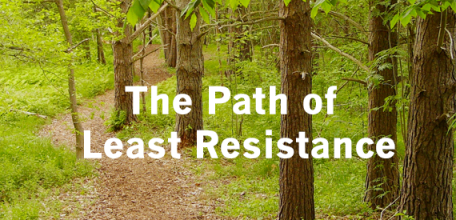
Have you ever noticed how we tend to take the same route to work, church or wherever we frequently travel? Most likely, it is because there is typically less traffic, or we go the same way in order to avoid deciding which route would be the best at the moment. All these reasons have the common idea—the path of least resistance.
Our habits many times can become ruts that desensitize us along our paths. We can become numb to what is happening around us when we are in our ruts. Someone once described to me that a rut is like being in a coffin with both ends kicked out. (Think that through awhile…)
Have you ever heard someone your riding with point out a new business, along the road you often travel, and realize that you had never noticed it? It reminds me of when I opened a new Boot Jack Western Store on the busiest street in town. Three years later, I decided to paint giant dairy cow spots all over the building. All of the sudden, for the next several weeks, we had customers coming in saying they were so glad we opened a new store close to where they live.
Over the years, I have heard people tell me how they “took the high road” when dealing with conflicts. In reality they were telling me they decided to simply let the issue fall by the wayside, ignoring it in the hopes that the person will change or that the situation would just go away. Maybe, in some cases, this is wisdom.
What about those situations that should not be postponed or ignored? I asked someone once “Why do you think you are taking the high road?” Unfortunately, their response was loaded with lame excuses in an attempt to avoid dealing with the problem at hand. Within a few months, “taking the high road” approach escalated the situation into a tragedy, leaving a trail of legal problems and very wounded people.
Satan’s regime will wreak havoc in the lives of those who choose the path of least resistance. It becomes a breeding ground for denial, neglect, and co-dependency—which are all forms of false peace. True, most of us prefer to evade confrontation and avoid establishing healthy boundaries. We justify our actions (or lack thereof) by saying that we are taking the “high road” or holding onto “faith” that the situation or person will change.
We rationalize our position with the intent to not add stress to those involved, or we put it back on God saying, “The Lord will take care of it.” When the reality may be that God wants to use you to establish healthy boundaries, intervene in unhealthy or abusive situations, or just plain confront someone in love with the truth that may very well be their key to real freedom.
When you think about it, the “high road” is up and can be more difficult to take than the lower route (i.e. path of least resistance).
A few years ago I visited a first-class substance abuse rehab center to hear testimonies from those who were graduating from their treatment term. I noticed a common theme from the rehabilitated addicts. Many said they continued in their addiction as long as there was someone around that would not draw boundaries with them. They explained how this allowed them to take advantage of other people’s resources so they could continue getting their “fix” without having to face the resistance of change. The addict’s path of least resistance fed off another taking a path of least resistance who would not establish boundaries—thus a critical link in a chain reaction of co-dependency.
Too often we fail to embrace situations that seem difficult, because we prefer to avoid the hassle of conflict, face fear of failure, appease expectations of others, or because we choose to take the path of convenience. When we do this, we not only keep others from growing, but we keep ourselves from being empowered to break free of character deficiencies that are keeping us from all that Christ has for us.
“Dear brothers and sisters, if another believer is overcome by some sin, you who are godly should gently and humbly help that person back onto the right path. And be careful not to fall into the same temptation yourself. Share each other’s burdens, and in this way obey the law of Christ. If you think you are too important to help someone, you are only fooling yourself. You are not that important.” ~Galatians 6:1-3 (NLT)
“Moreover if your brother sins against you, go and tell him his fault between you and him alone. If he hears you, you have gained your brother.” ~Matthew 18:15 (NKJV)
“Instead, we will speak the truth in love, growing in every way more and more like Christ, who is the head of his body, the church.” ~Ephesians 4:15 (NLT-emphasis mine)
“Therefore, having put away falsehood, let each one of you speak the truth with his neighbor, for we are members one of another.” ~Ephesians 4:25 (ESV)
